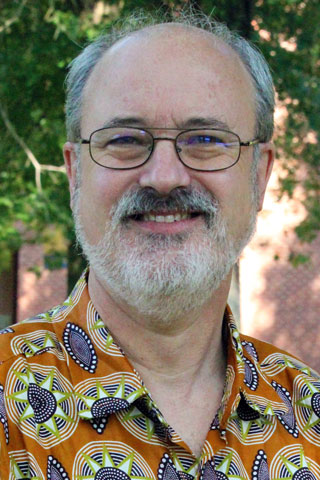Ulin publishes book of transatlantic correspondence
Quaker woman writes home to England from Ohio frontier

Dr. Donald Ulin, associate professor of English at the University of Pittsburgh at Bradford, has edited and annotated a book of letters from a 19th-century Quaker woman living on the Ohio frontier to her family in England, including Mary Howitt, one of the most popular writers of her day.
“Writing Home: A Quaker Immigrant on the Ohio Frontier,” published by Bucknell University Press covers five years of letters from Emma Alderson, ranging from messages of longing for her family written while still docked off Liverpool, England, to descriptions of ante-bellum Cincinnati, where she and her husband settled after a journey by canal to Pittsburgh and a posh steamship trip down the Ohio River.
The letters, Ulin said, describe in depth many of the experiences of immigrants at the time – a two-month voyage by sailing ship, the challenges of winter, first impressions of a new land and people, the trials of people recently freed or escaped from slavery, Shaker life, rich landscapes, and much more.
Cincinnati itself was an interesting place at the time, Ulin said, as an early gateway to the West on the Ohio River. It was a northern city without slavery, but across the river from Kentucky, which tied it economically and culturally to the South.
Alderson, 36, and her husband, Harrison, 32, had traveled steerage to America with three children, having lost their oldest child in England. Two more children were born in America, the last of which ended tragically in Alderson's death in 1847.
After being “a bit wild” in her youth, Alderson had married later in life, Ulin explained. “She chafed a lot at the expectations for a young Quaker woman.”
Ulin’s interest in the letters began with Alderson’s sister, Mary Howitt, author of “Our Cousins in Ohio,” an account of an unnamed family living on the American frontier that was based on Alderson’s letters home.
Ulin’s primary area of research is 19th century British literature. He was researching Howitt when he came across a notice that the University of Nottingham had purchased a collection of letters from Alderson to Howitt.
With a faculty development grant from Pitt-Bradford, Ulin traveled to England to read them. “They were fascinating,” he said. “They were far less polished than the book (by Howitt), but they were much richer in their details. They showed this immigrant sister actually living and writing in her land.”
The letters themselves became the focal point of his study. He thought they would be of interest to scholars in the broad and growing field of transatlantic studies as well as non-academic readers interested in the writing of ordinary citizens.
Working from the originals in Nottingham, Ulin transcribed and then edited hundreds of pages of letters, often with the help of Pitt-Bradford research assistants.
“She didn’t tend to use periods,” he said of her subject. “Paper was expensive, and there were few paragraph breaks.”
Ulin edited the letters so that they could be more easily read, but he treaded lightly. “I wanted to keep the rough, impetuous feeling of this language, which meant retaining much of the unorthodox spelling and punctuation."
In addition to editing, Ulin extensively annotated the letters, adding a foreword, several introductions, and hundreds of footnotes for context.
“It was fun for me to write this because it led me to learn a lot about American history,” he said.
The project raised Ulin’s interest in ordinary writers, and his next project will be a chapter on Quaker women writers for an encyclopedia of Victorian women writers.
--30--